- Home
- Barbara Pym
Excellent Women Page 2
Excellent Women Read online
Page 2
There remain many whose lives are not as romantic as Jane Eyre’s, still less as sexually fulfilled as Lady Chatterley’s. Dare one suggest that any amount of social change does not alter the fact that the majority of human beings find life emotionally unfulfilling, and humdrum, and that after a certain point (an alarmingly early point in most human lives) one realises there isn’t much one can do about this fact? For such as these, Pym’s fiction is not just a slice of mild mid-twentieth-century comedy. It is a series of snapshots of human life as actually, and pluckily, lived. That perhaps is why her books, though so unpretentious and in some ways ‘light’, have stood the test of time so much better than many novels by her contemporaries, who took themselves, and life, more seriously.
A. N. WILSON
Excellent Women
CHAPTER ONE
‘Ah, you ladies! Always on the spot when there’s something happening!’ The voice belonged to Mr. Mallett, one of our churchwardens, and its roguish tone made me start guiltily, almost as if I had no right to be discovered outside my own front door.
‘New people moving in? The presence of a furniture van would seem to suggest it,’ he went on pompously. ‘I expect you know about it.’
‘Well, yes, one usually does,’ I said, feeling rather annoyed at his presumption. ‘It is rather difficult not to know such things.’
I suppose an unmarried woman just over thirty, who lives alone and has no apparent ties, must expect to find herself involved or interested in other people’s business, and if she is also a clergyman’s daughter then one might really say that there is no hope for her.
‘Well, well, tempus fugit, as the poet says,’ called out Mr. Mallett as he hurried on.
I had to agree that it did, but I dawdled long enough to see the furniture men set down a couple of chairs on the pavement, and as I walked up the stairs to my flat I heard the footsteps of a person in the empty rooms below me, pacing about on the bare boards, deciding where each piece should go.
Mrs. Napier, I thought, for I had noticed a letter addressed to somebody of that name, marked ‘To Await Arrival’. But now that she had materialised I felt, perversely, that I did not want to see her, so I hurried into my own rooms and began tidying out my kitchen.
I met her for the first time by the dustbins, later that afternoon. The dustbins were in the basement and everybody in the house shared them. There were offices on the ground floor and above them the two flats, not properly self-contained and without every convenience. ‘I have to share a bathroom,’ I had so often murmured, almost with shame, as if I personally had been found unworthy of a bathroom of my own.
I bent low over the bin and scrabbled a few tea leaves and potato peelings out of the bottom of my bucket. I was embarrassed that we should meet like this. I had meant to ask Mrs. Napier to coffee one evening. It was to have been a gracious, civilised occasion, with my best coffee cups and biscuits on little silver dishes. And now here I was standing awkwardly in my oldest clothes, carrying a bucket and a waste-paper-basket.
Mrs. Napier spoke first.
‘You must be Miss Lathbury,’ she said abruptly. ‘I’ve seen your name by one of the door-bells.’
‘Yes, I live in the flat above yours. I do hope you’re getting comfortably settled in. Moving is such a business, isn’t it? It seems to take so long to get everything straight. Some essential thing like a teapot or a frying-pan is always lost. . . .’ Platitudes flowed easily from me, perhaps because, with my parochial experience, I know myself to be capable of dealing with most of the stock situations or even the great moments of life—birth, marriage, death, the successful jumble sale, the garden fête spoilt by bad weather. . . . ‘Mildred is such a help to her father,’ people used to say after my mother died.
‘It will be nice to have somebody else in the house,’ I ventured, for during the last year of the war my friend Dora Caldicote and I had been the only occupants, and I had been quite alone for the past month since Dora had left to take up a teaching post in the country.
‘Oh, well, I don’t suppose I shall be in very much,’ said Mrs. Napier quickly.
‘Oh, no,’ I said, drawing back; ‘neither shall I.’ In fact, I was very often in, but I understood her reluctance to pledge herself to anything that might become a nuisance or a tie. We were, superficially at any rate, a very unlikely pair to become friendly. She was fair-haired and pretty, gaily dressed in corduroy trousers and a bright jersey, while I, mousy and rather plain anyway, drew attention to these qualities with my shapeless overall and old fawn skirt. Let me hasten to add that I am not at all like Jane Eyre, who must have given hope to so many plain women who tell their stories in the first person, nor have I ever thought of myself as being like her.
‘My husband will be coming out of the Navy soon,’ said Mrs. Napier, almost in a warning tone. ‘I’m just getting the place ready.’
‘Oh, I see.’ I began to wonder what could have brought a naval officer and his wife to this shabby part of London, so very much the ‘wrong’ side of Victoria Station, so definitely not Belgravia, for which I had a sentimental affection, but which did not usually attract people who looked like Mrs. Napier. ‘I suppose it’s still very difficult to find a flat,’ I went on, driven by curiosity. ‘I’ve been here two years and it was much easier then.’
‘Yes, I’ve had an awful time and this isn’t really what we wanted. I don’t at all like the idea of sharing a bathroom,’ she said bluntly, ‘and I don’t know what Rockingham will say.’
Rockingham! I snatched at the name as if it had been a precious jewel in the dustbin. Mr. Napier was called Rockingham! How the bearer of such a name would hate sharing a bathroom! I hastened to excuse myself. ‘I’m always very quick in the mornings, and on Sundays I usually get up early to go to church,’ I said.
She smiled at this, and then seemed to feel bound to add that of course she had no use for church-going.
We walked upstairs in silence with our buckets and waste-paper-baskets. The opportunity for ‘saying a word’, which was what our vicar always urged us to do, came and went. We had reached her flat, and much to my surprise she was asking me if I would like to have a cup of tea with her.
I don’t know whether spinsters are really more inquisitive than married women, though I believe they are thought to be because of the emptiness of their lives, but I could hardly admit to Mrs. Napier that at one point during the afternoon I had arranged to be brushing my flight of stairs so that I could peer through the banisters and watch her furniture being brought in. I had noticed then that she had some good things—a walnut bureau, a carved oak chest and a set of Chippendale chairs, and when I followed her into her sitting-room I realised that she also possessed some interesting small objects, Victorian paper-weights and snowstorms, very much like those I had on my own mantel-piece upstairs.
‘Those are Rockingham’s,’ she said, when I admired them. ‘He collects Victoriana.’
‘I have hardly needed to collect them,’ I said. ‘My old home was a rectory and full of such objects. It was quite difficult to know what to keep and what to sell.’
‘I suppose it was a large, inconvenient country rectory with stone passages, oil lamps and far too many rooms,’ she said suddenly. ‘One has a nostalgia for that kind of thing sometimes. But how I’d hate to live in it.’
‘Yes, it was like that,’ I said, ‘but it was very pleasant. I sometimes feel rather cramped here.’
‘But surely you have more rooms than we have?’
‘Yes, I’ve got an attic, too, but the rooms are rather small.’
‘And there’s the shared bathroom,’ she murmured.
‘The early Christians had all things in common,’ I reminded her. ‘Be thankful that we have our own kitchens.’
‘Oh, God, yes! You’d hate sharing a kitchen with me. I’m such a slut,’ she said, almost proudly.
While she made the tea I occupied myself by looking at her books, which were lying in stacks on the floor. Many of them seemed
to be of an obscure scientific nature, and there was a pile of journals with green covers which bore the rather stark and surprising title of Man. I wondered what they could be about.
‘I hope you don’t mind tea in mugs,’ she said, coming in with a try. ‘I told you I was a slut.’
‘No, of course not,’ I said in the way that one does, thinking that Rockingham would probably dislike it very much.
‘Rockingham does most of the cooking when we’re together,’ she said. ‘I’m really too busy to do much.’
Surely wives shouldn’t be too busy to cook for their husbands? I thought in astonishment, taking a thick piece of bread and jam from the plate offered to me. But perhaps Rockingham with his love of Victoriana also enjoyed cooking, for I had observed that men did not usually do things unless they liked doing them. ‘I suppose the Navy has taught him that?’ I suggested.
‘Oh, no, he’s always been a good cook. The Navy hasn’t taught him anything, really.’ She sighed. ‘He’s been Flag Lieutenant to an Admiral in Italy and lived in a luxurious villa overlooking the Mediterranean for the past eighteen months, while I’ve been trailing round Africa.’
‘Africa?’ I echoed in amazement. Could she be a missionary, then? It seemed very unlikely and I suddenly remembered that she had said she never went to church.
‘Yes, I’m an anthropologist,’ she explained.
‘Oh.’ I was silent with wonder, and also because I was not at all sure what an anthropologist was and could think of no intelligent comment to make.
‘Rockingham hasn’t had to do anything much but be charming to a lot of dreary Wren officers in ill-fitting white uniforms, as far as I can make out.’
‘Oh, surely . . .’ I began to protest, but then decided that this was, after all, a work well worth doing. Clergymen were often good at it; indeed, so many of their flock wore drab, ill-fitting clothes that it came as second nature to them. I had not realised that it might also be among the accomplishments of naval officers.
‘I’ve got to write up my field notes now,’ Mrs. Napier went on.
‘Oh, yes, of course. How interesting . . .’
‘Well, well . . .’ she stood up and put her mug down on the tray. I felt that I was being dismissed.
‘Thank you for the tea,’ I said. ‘You must come and see me when you get settled. Do let me know if there’s anything I can do to help.’
‘Not at the moment, thank you,’ she said, ‘but there may be.’
I thought nothing of her words at the time. It did not seem then as if our lives could ever touch at any point beyond a casual meeting on the stairs and of course the sharing of a bathroom.
This last idea may have occurred to her too, for when I was halfway up the stairs to my own flat she called out, ‘I think I must have been using your toilet paper. I’ll try and remember to get some when it’s finished.’
‘Oh, that’s quite all right,’ I called back, rather embarrassed. I come from a circle that does not shout aloud about such things, but I nevertheless hoped that she would remember. The burden of keeping three people in toilet paper seemed to me rather a heavy one.
When I got into my sitting-room I found to my surprise that it was nearly six o’clock. We must have talked for over an hour. I decided that I did not like Mrs. Napier very much, and then began to reproach myself for lack of Christian charity. But must we always like everybody? I asked myself. Perhaps not, but we must not pass judgment on them until we have known them a little longer than one hour. In fact, it was not our business to judge at all. I could hear Father Malory saying something of the kind in a sermon, and at that moment St. Mary’s clock began to strike six.
I could just see the church spire through the trees in the square. Now, when they were leafless, it looked beautiful, springing up among the peeling stucco fronts of the houses, prickly, Victorian-gothic, hideous inside, I suppose, but very dear to me.
There were two churches in the district, but I had chosen St. Mary’s rather than All Souls’, not only because it was nearer, but because it was ‘High’. I am afraid my poor father and mother would not have approved at all and I could imagine my mother, her lips pursed, shaking her head and breathing in a frightened whisper, ‘Incense.’ But perhaps it was only natural that I should want to rebel against my upbringing, even if only in such a harmless way. I gave All Souls’ a trial; indeed I went there for two Sundays, but when I returned to St. Mary’s, Father Malory stopped me after Mass one morning and said how glad he was to see me again. He and his sister had been quite worried; they feared I might have been ill. After that I had not left St. Mary’s again, and Julian Malory and his sister Winifred had become my friends.
I sometimes thought how strange it was that I should have managed to make a life for myself in London so very much like the life I had lived in a country rectory when my parents were alive. But then so many parts of London have a peculiarly village or parochial atmosphere that perhaps it is only a question of choosing one’s parish and fitting into it. When my parents had died, within two years of each other, I was left with a small income of my own, an assortment of furniture, but no home. It was then that I had joined forces with my old school friend Dora Caldicote, and while she was teaching I worked in the Censorship, for which, very fortunately, no high qualifications appeared to be necessary, apart from patience, discretion and a slight tendency towards eccentricity. Now that Dora had gone I looked forward to being alone once more, to living a civilised life with a bedroom and a sitting-room and a spare room for friends. I have not Dora’s temperament which makes her enjoy sleeping on a camp bed and eating off plastic plates. I felt that I was now old enough to become fussy and spinsterish if I wanted to. I did part-time work at an organisation which helped impoverished gentlewomen, a cause very near to my own heart, as I felt that I was just the kind of person who might one day become one. Mrs. Napier, with her gay trousers and her anthropology, obviously never would.
I was thinking about her as I changed to go out to supper at the vicarage, and was glad that I was wearing respectable clothes when I met her on the stairs with a tall, fair man.
‘You’ll have to drink gin out of a mug,’ I heard her say. ‘The glasses aren’t unpacked.’
‘It doesn’t matter,’ he answered rather stiffly as if it mattered a great deal. ‘I suppose you haven’t got things straight yet.’
Not Rockingham, I felt; no, it could hardly be when he was in Italy being charming to Wren officers. Perhaps a fellow anthropologist? The bell of St. Mary’s began to ring for Evensong and I realised that it was none of my business who he was. It was too early to go to the vicarage, so I hurried into church and took my place with the half-dozen middle-aged and elderly women who made up the weekday evening congregation. Winifred Malory, late as always, came and sat by me and whispered that somebody had sent quite a large donation, most generous, towards the cost of repairing the west window which had been damaged by a bomb. An anonymous donation—wasn’t it exciting? Julian would tell me about it at supper.
CHAPTER TWO
Julian Malory was about forty, a few years younger than his sister. Both were tall, thin and angular, but while this gave to Julian a suitable ascetic distinction, it only seemed to make Winifred, with her eager face and untidy grey hair, more awkward and gaunt. She was dressed, as usual, in an odd assortment of clothes, most of which had belonged to other people. It was well known that Winifred got most of her wardrobe from the garments sent to the parish jumble sales, for such money as she had was never spent on herself but on Good—one could almost say Lost—Causes, in which she was an unselfish and tireless worker. The time left over from these good works was given to ‘making a home’ for her brother, whom she adored, though she was completely undomesticated and went about it with more enthusiasm than skill.
‘If only I could paint the front door!’ she said, as the three of us went into the vicarage after Evensong. ‘It looks so dark and drab. A vicarage ought to be a welcoming sort of place with a bright entr
ance.’
Julian was hanging up his biretta on a peg in the narrow hall. Next to it hung a rather new-looking panama hat. I had never seen him wearing it and it occurred to me that perhaps he had bought it to keep until its ribbon became rusty with age and the straw itself a greyish yellow. My father had worn just such a hat and it always seemed to me to epitomise the wisdom of an old country clergyman, wisdom which Julian could not hope to attain for another twenty or thirty years.
‘A welcoming sort of place with a bright entrance,’ Julian repeated. ‘Well, I hope people do get a welcome even if our front door is dark and I hope Mrs. Jubb has got some supper for us.’
I sat down at the table without any very high hopes, for both Julian and Winifred, as is often the way with good, unworldly people, hardly noticed what they ate or drank, so that a meal with them was a doubtful pleasure. Mrs. Jubb, who might have been quite a good cook with any encouragement, must have lost heart long ago. Tonight she set before us a pale macaroni cheese and a dish of boiled potatoes, and I noticed a blancmange or ‘shape’, also of an indeterminate colour, in a glass dish on the sideboard.

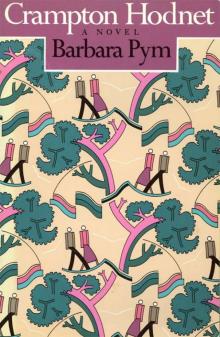 Crampton Hodnet
Crampton Hodnet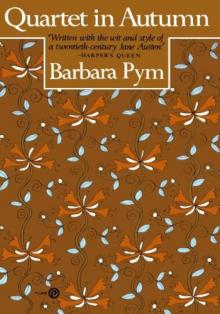 Quartet in Autumn
Quartet in Autumn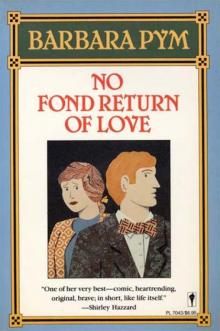 No Fond Return of Love
No Fond Return of Love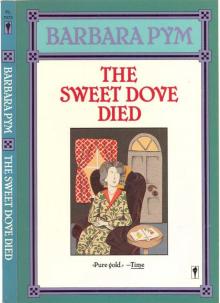 The Sweet Dove Died
The Sweet Dove Died Excellent Women
Excellent Women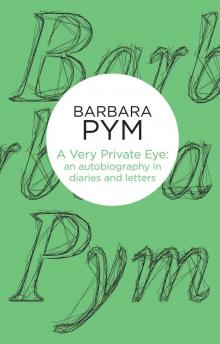 A Very Private Eye: The Diaries, Letters and Notebooks of Barbara Pym
A Very Private Eye: The Diaries, Letters and Notebooks of Barbara Pym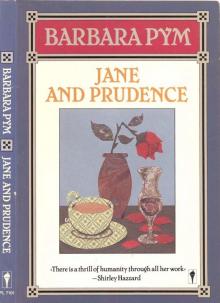 Jane and Prudence
Jane and Prudence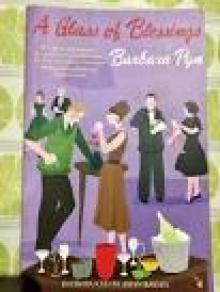 A Glass of Blessings
A Glass of Blessings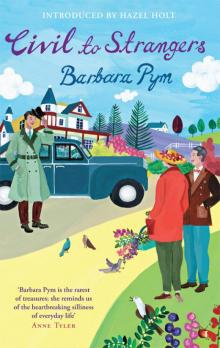 Civil to Strangers and Other Writings
Civil to Strangers and Other Writings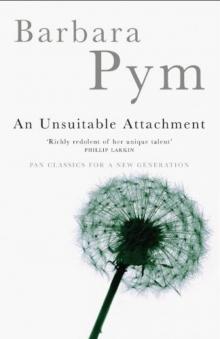 An Unsuitable Attachment
An Unsuitable Attachment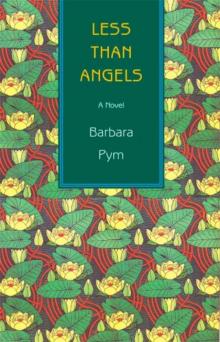 Less Than Angels
Less Than Angels A Few Green Leaves
A Few Green Leaves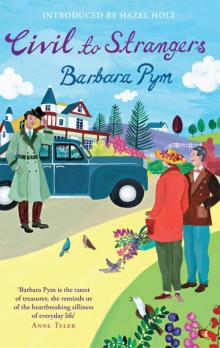 Civil to Strangers
Civil to Strangers